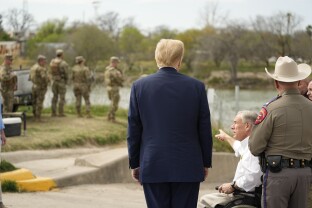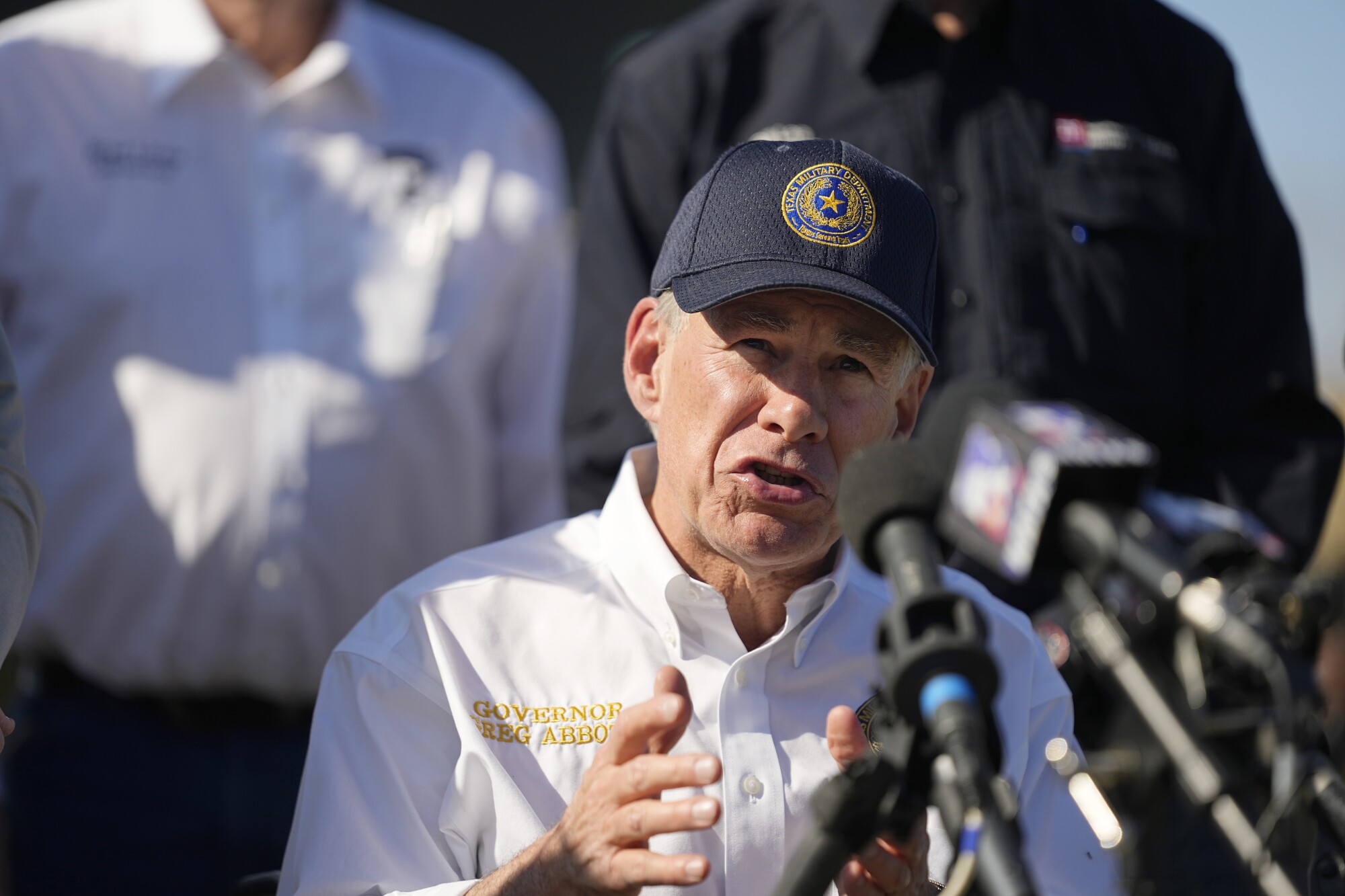EAGLE PASS, TX — It’s hard to tell that South Texas is a battleground. Kamala Harris certainly isn’t campaigning here. Her Beyoncé-studded Texas rally was for Houston. Democrats’ best hope of taking out Sen. Ted Cruz, Colin Allred, has spent some time campaigning in the Rio Grande Valley, but other than that, there’s not much star power devoted to these Texas border counties.
Beto O’Rourke appears to be the only big-name Democratic surrogate coming down in the very final stretch of the campaign cycle.
“If you don’t do the work, you know, Greg Abbott is showing up,” O’Rourke told NOTUS in Eagle Pass. “They’re putting dollars into this community. They recognize that national Democrats have left communities like Eagle Pass to their own devices without any real outside help or support.”
Democrats may come to regret not focusing more on the region. If they let the area go, it could eventually cost Democrats two blue seats in the House and knock one of the only competitive districts in the state back out of play — a potentially huge win for Republicans in a Congress governed by slim majorities.
There is an argument that South Texas, sparsely populated and so difficult to engage, isn’t worth the resources. Democrats in the area, though, acknowledge that the political realignment is real, and it’s one that could have real impacts in the long term.
O’Rourke said that these border towns haven’t been getting much attention.
“We’ve kind of said, ‘Look, if you’re Black, if youre brown, you’re going to vote for us. So why should we bother?’” he said of Democrats. “We will chase the white soccer mom in suburban Dallas, and she’s important, too, but she’s not more important than the people here.”
In a statement, Texas Democratic Party Executive Director Monique Alcala told NOTUS that “South Texas remains a priority for our party and for our top-of-ticket candidates,” pointing to O’Rourke’s visit to campaign alongside Michelle Vallejo and state Senator Morgan LaMantiaas, as well as Colin Allred visits to the region.
Trump made serious inroads in South Texas in 2020. In 2016, he won about 21% of voters in Maverick County, home to Eagle Pass. Four years later, he won 45% of voters. A similar story played out in Starr County, per The Texas Tribune: home to Rio Grande City, Trump lost to Joe Biden by only 5%. He’d lost the county by 60% in 2016.
Since then, Eagle Pass has become the poster child for the border crisis. Republicans have flocked to the town to hold press conferences, and Gov. Greg Abbott started a fight with the federal government by erecting razor wire in between the Rio Grande and a park in Eagle Pass.
Many Democratic political operatives have resisted the notion that the region is changing.
“South Texans know that Republicans’ focus on culture wars does nothing to solve the kitchen table issues that keep families up at night,” Alcala said in a statement. “That’s why the ‘Red Wave’ that Republicans assured us would sweep over the RGV in 2022 turned out to be more of a flurry.”
But local residents and politicians acknowledge there’s been a shift.
“Before it was all Democratic primaries within our local dignitaries, and once they would win that, there was no Republican opposer. A lot of these candidates now have Republican opposition,” Christopher Hiller, a self-described independent voting for Trump and running for a local school board seat, said.
“It has surprised me. I’m a lifelong resident of Eagle Pass, and I never thought that in my life I would see that,” Evangelina De Leon, former secretary of the Maverick County Democratic Party, said. “I do not understand why. It is beyond me why people from Eagle Pass or even any Latino supports Trump.”
Last Friday, local Republicans in Eagle Pass brought a truck decked out in Trump flags and a huge board covered in “I voted” stickers. Former Maverick County Republican Party Chair Alfredo Arellano said they had more than 1,000 stickers from Trump voters on the board. That’s not a huge share of the vote, but it’s a notable public show of support in a county that locals say once voted for Democrats reflexively.
“We’ve given out over 1,000 Trump signs,” Arellano said. “In 2020, we had so many reports of them being stolen. Right now, we have not received a single one.”
Arellano said the Republican Party “woke up” after the 2016 election and started building infrastructure.
“We managed to make that 75/25 margin, a 55/45 margin. And now this election cycle, we’re looking to break it,” he said.
Trump isn’t the only Republican candidate winning.
Rep. Tony Gonzales won Maverick County in 2022 — the first time a Republican congressional candidate had done so since 2004. In Zapata County, the long rural stretch south of Laredo, Abbott was able to beat out O’Rourke.
Republicans have several seats they’d like to pick up in the area, as they did in Republican Rep. Monica De La Cruz’s district in 2022. They’re still dumping millions of dollars into a seat that was briefly held by former Rep. Mayra Flores in a special election. She was defeated later by Democratic Rep. Vicente Gonzalez. In previous cycles, the GOP has also made Rep. Henry Cuellar of Laredo a top target.
Abbott and other Republican groups have also invested in three statehouse races in South Texas. Eddie Morales, the statehouse representative for Maverick County, whose district is largely similar to Gonzales’ congressional one, is one of those targets. Abbott and other Republican groups have attacked Morales for voting against school choice, Morales said, and that Republicans want his expansive district, which covers multiple border counties, because it will encourage the narrative that the border is swinging.
Morales said national Democrats can still win there — it just takes a lot of investment.
“I outperformed every Democrat in Maverick County, and so I think that also shows that when people know you and when people actually see the vision that you have, you will get that crossover vote,” he said. “It’s a lot of work, though, so I can see how it’s so difficult for state leaders or federal leaders to be able to do that and visit every one of these counties.”
Democrats like Morales are convinced that the shift right is more about Trump than it is about a growing Republican base in the area.
“I think it was an anomaly, right, with Trump,” he said. “I really do truly believe that once we get past this election and have success on Nov. 5 that we are going to get past this whole mess and this whole chaos and that we will have some sort of return to normalcy.”
He wasn’t the only one to share this hope.
“To me, it’s an anomaly and I think once Trump is gone, it’ll die down. That’s my hope,” Democratic County Chair Juanita Martinez said.
Democrats point to ticket splitters, in particular, when explaining the singular power of Trump.
Cecilia Castellano, the Democratic candidate for a statehouse seat that includes greater Webb County, and extends up to Uvalde, said she’s also noticed increasing support for Trump.
“I have seen that,” she said, “but at the same time, I have a lot of those people that are also voting for me.”
Others said that Trump hasn’t shaken the Democratic base as much as he has engaged previously dormant voters. There are some signs that’s true.
In Maverick, nearly 1,800 more people voted on the presidential ticket from 2016 to 2020. In Zapata County, which made headlines after Trump became the first GOP presidential candidate to win there in nearly a century, almost 800 more people voted. Since these are sparsely populated counties, even small increases in turnout can change the dynamic of a race significantly.
That said, in elections prior to 2020, Republicans were routinely trounced by margins upwards of 30%. Now, races are closer. And decades of disinvestment in South Texas has hurt Democrats without roots in the area.
“I really don’t know much about the national elections because what affects us more is the local stuff, so I stay out of the national,” Gera Villalpando, a candidate for hospital board who self-identified as a conservative liberal. He’s one of several people who told NOTUS they didn’t vote in the competitive Senate race between Cruz and Allred.
“I don’t even think I even voted for any of them just because I don’t know enough about them,” Hiller said of the Senate race. “I guarantee you a lot of people are doing that.”
—
Casey Murray is a NOTUS reporter and an Allbritton Journalism Institute fellow.
Sign in
Log into your free account with your email. Don’t have one?
Check your email for a one-time code.
We sent a 4-digit code to . Enter the pin to confirm your account.
New code will be available in 1:00
Let’s try this again.
We encountered an error with the passcode sent to . Please reenter your email.



